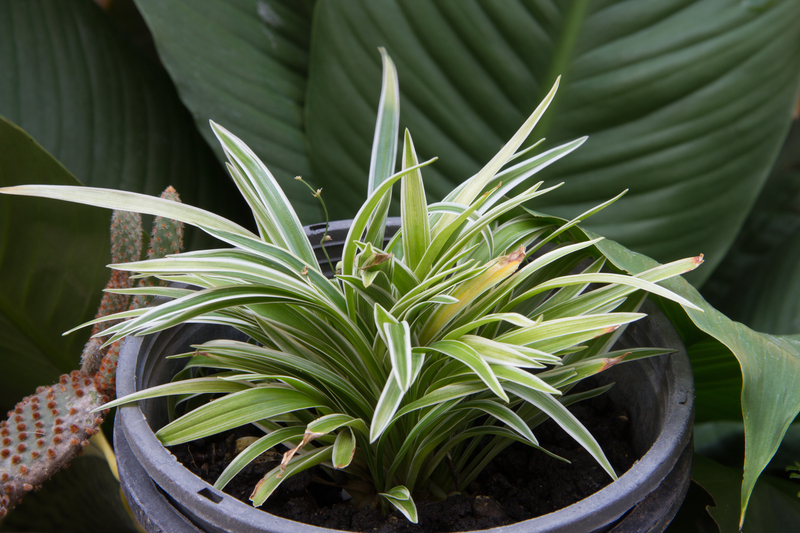A Greener Earth: Fighting Climate Change Through Gardening
Posted on 05/06/2025
A Greener Earth: Fighting Climate Change Through Gardening
Climate change is an urgent global issue. As individuals, communities, and nations, we must unite in the pursuit of a greener earth. While large-scale solutions are key, small actions--like gardening--can make a substantial impact. Harnessing the power of gardens not only beautifies our spaces but also helps mitigate the effects of climate change. In this comprehensive article, we'll explore how sustainable gardening practices contribute to a healthier planet and empower you with ways to transform your garden into a climate ally.
Understanding the Connection: Gardening and Climate Change
The link between climate change and gardening may not be immediately obvious. Yet, gardens play a critical role in reducing greenhouse gases, enhancing biodiversity, and promoting sustainable living. These green spaces can sequester carbon, improve air and water quality, and act as havens for native flora and fauna.
Why is Gardening Important in the Fight Against Climate Change?
- Carbon Sequestration: Plants absorb carbon dioxide (CO2), a major greenhouse gas, storing it in their roots, stems, and leaves--thus mitigating the greenhouse effect.
- Biodiversity Support: Gardens foster essential ecosystems, supporting pollinators, birds, and beneficial insects, all crucial for climate resilience.
- Reduction of Heat Islands: Green areas cool our surroundings, decreasing urban heat island effects and reducing energy consumption for cooling.
- Sustainable Resource Use: Gardening encourages composting, water conservation, and organic practices--reducing reliance on synthetic fertilizers or chemicals that contribute to pollution.
- Food Security & Reduced Food Miles: Growing your own food slashes emissions from transport, processing, and packaging associated with industrial agriculture.

How Gardens Help Cultivate a Greener Earth
A greener earth starts in our own backyards. Whether you have a windowsill, balcony, or sprawling yard, your gardening choices matter. Let's delve into the critical roles that gardens play in mitigating the impacts of climate change:
1. Natural Carbon Capture
Plants are nature's carbon captors. Through the process of photosynthesis, they absorb CO2 from the atmosphere and lock that carbon into their tissues and the surrounding soil. Trees, perennial shrubs, and deep-rooted native plants are especially effective at sequestering carbon for many years. By choosing to plant a variety of species and maintaining healthy soil, gardeners can maximize this natural defense against climate change.
2. Biodiversity Hotspots
A diverse garden supports a wide range of organisms--from earthworms and bees to birds and butterflies. These creatures ensure pollination, natural pest control, and healthy ecosystems, making the environment more resilient against climate shocks.
3. Fighting Pollution and Improving Air Quality
Gardens act as natural air filters. Plants can trap particulate pollution, absorb pollutants like ozone or nitrogen dioxide, and release oxygen--improving community health while helping slow the progress of a warming planet.
4. Water Management
Gardens with permeable soils and dense vegetation reduce surface runoff, minimize flooding, and promote groundwater recharge. Rain gardens, for instance, are specially designed to capture and filter stormwater, protecting both urban and rural environments from erosion and water pollution.
Sustainable Gardening Practices to Fight Climate Change
To truly harness your garden as a tool for building a greener earth, integrate sustainable gardening methods. Each mindful choice sends ripples of positive change throughout the environment.
Choose Native Plants
Native plants are adapted to your region's climate, soils, and pests. They require less water, fewer fertilizers, and no synthetic pesticides. Their deep roots help store more carbon, resist drought, and support local wildlife. Consider turning lawn space into wildflower meadows or native plant beds for high-impact results.
Prioritize Organic Gardening
- No Synthetic Chemicals: Avoid chemical fertilizers, herbicides, and pesticides. Use compost, green manure, and natural pest controls like ladybugs and neem oil.
- Build Healthy Soil: Add compost or well-rotted manure to improve soil fertility and boost microbial life, which supports nutrient cycling and carbon storage.
Compost Food and Garden Waste
Composting transforms organic waste into nutrient-rich humus, returning carbon to the soil instead of releasing methane in landfills. Use kitchen scraps, grass clippings, and leaves to create your own compost heap.
Practice Water Conservation
- Mulching: Cover soil with organic mulch like straw or leaves to reduce evaporation and suppress weeds.
- Drip Irrigation: Install drip or soaker hoses that target water directly to plant roots, minimizing waste.
- Collect Rainwater: Use rain barrels or install rain gardens to capture precious rainfall for use in dry spells.
Adopt Regenerative Gardening Techniques
Regenerative gardening goes beyond sustainability by restoring soil health and ecosystem functions. Practices such as cover cropping, no-dig gardening, and permaculture design boost organic matter, reduce erosion, and create self-sustaining landscapes.
Reduce Lawn Area
Traditional lawns often require intensive maintenance, water, and chemicals. Replace some or all of your lawn with beds of native grasses, wildflowers, or edible plants to increase biodiversity and carbon storage while saving resources.
The Benefits of Climate-Conscious Gardening
A climate-friendly garden doesn't just protect the environment--it also delivers health, social, and economic rewards. Here are some of the many benefits:
- Improved Mental and Physical Health: Gardening reduces stress, promotes physical activity, and improves mood.
- Enhanced Community Well-being: Community gardens aid in food security, education, and social cohesion.
- Financial Savings: Growing your own produce reduces grocery bills and reliance on external food sources.
- Wildlife Habitat Creation: Climate-smart gardens provide crucial food and shelter for pollinators and beneficial animals.
- Resilience to Climate Extremes: Diverse, healthy gardens resist droughts, floods, and pest outbreaks better than monocultures.
Urban Gardening: Bringing Green Solutions to Cities
With most of the world's population living in urban environments, city-based green spaces are the front lines of climate change mitigation. Urban gardening initiatives like rooftop gardens, vertical walls, pocket parks, and community plots make cities more livable and sustainable.
How Urban Gardens Fight Climate Change
- Cool Urban Heat Islands: Increasing vegetation lowers temperatures and reduces energy used for cooling buildings.
- Improve Air Quality: Dense plantings filter air pollutants and produce oxygen, improving urban health.
- Encourage Local Food Production: Community gardens bring people together, reduce food miles, and increase access to fresh produce.
- Stormwater Management: Green roofs and rain gardens absorb rainwater, reducing flooding and sewer overflows.
Simple Steps to Start Your Climate-Friendly Garden
Ready to transform your garden into a force for positive environmental change? Here's how you can begin your journey toward a greener earth:
- Assess Your Space: Start small--a window box, balcony, or corner of your yard can make a difference.
- Plan for Diversity: Mix flowers, vegetables, herbs, shrubs, and trees to maximize biodiversity and resilience.
- Source Locally: Buy seeds, plants, and soil amendments from local nurseries whenever possible to reduce emissions from transportation.
- Go Organic: Commit to natural fertilizers and pest controls from day one.
- Compost Everything: Set up a compost bin for food and yard waste.
- Water Wisely: Invest in efficient watering systems and mulch.
- Engage with Community: Share your successes, swap seeds, and volunteer at local green spaces to multiply your impact.
Advanced Tips for Experienced Eco-Gardeners
- Practice Crop Rotation: Change plant locations each year to prevent soil depletion and pest buildup.
- Grow Perennial Vegetables: These store carbon year-round and require less tilling and watering.
- Integrate Trees and Shrubs: Even in small spaces, adding woody plants increases carbon sequestration and supports wildlife.
- Adopt Permaculture Principles: Design your garden to mimic natural systems for maximum efficiency and minimum waste.
- Monitor and Adapt: Track the environmental impact of your gardening practices and seek continual improvement.

Frequently Asked Questions
Can gardening really make an impact on a global scale?
Yes! While individual gardens may seem small, the collective impact is immense. If cities, suburbs, and rural communities all embrace eco-friendly gardening, we can sequester significant carbon, cool our neighborhoods, and support wildlife corridors worldwide.
What are the most climate-effective plants to grow?
Trees, deep-rooted perennials, and native grasses top the list for long-term carbon storage. Consider species adapted to your local environment for best results and resilience against climate stressors.
How do I reduce my garden's carbon footprint?
- Use hand tools instead of gas-powered equipment.
- Make compost instead of buying peat-based soil mixes.
- Grow organic and minimize external inputs.
- Choose perennial and native plants for longer carbon storage.
Conclusion: Cultivating Hope for a Greener Earth
A greener earth is within reach, and fighting climate change through gardening is a nurturing, rewarding, and profoundly effective way to get there. Whether you're tending tomatoes on your windowsill or transforming a community plot, every plant makes a difference. By embracing sustainable gardening practices, conserving resources, supporting biodiversity, and inspiring others, you become a vital steward in the global movement for environmental health.
Start today. Let your garden grow into a living testament for climate action and a more vibrant, sustainable planet for future generations.
Related Articles:
- 10 Sustainable Gardening Tips for Beginners
- How Native Plants Can Transform Your Garden and the Environment
- Urban Gardening: Benefits for People and Planet
Latest Posts
Curating an Interactive Outdoor Haven for Kids
Essential Garden Safety Tips for Dog Owners
Evergreen Climbers for Shade: Envisioning Verdant Sanctuaries
9 Crucial Gardening Tips to Inspire the Budding Botanist in You

